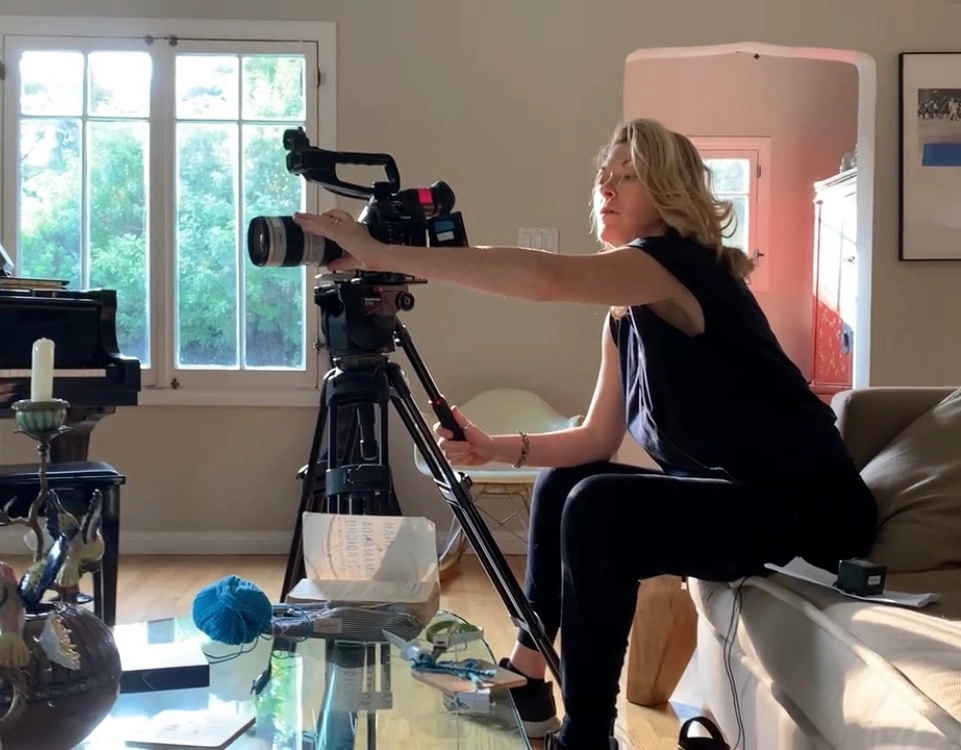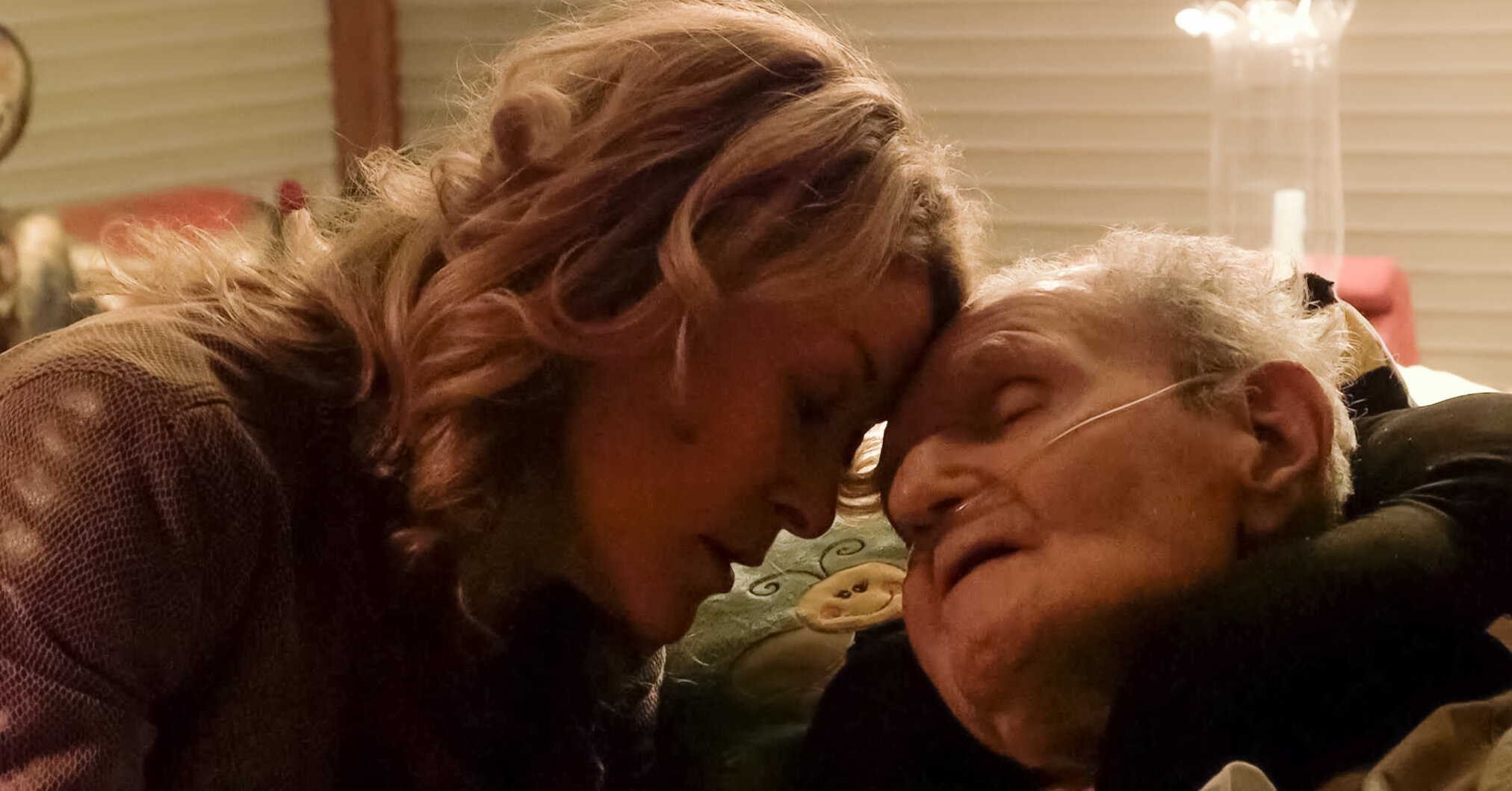“I really wanted to pull people into the room, invite them to be part of our family, and invite them to be there by my dad’s bedside”; ONDI TIMONER on the making of “LAST FLIGHT HOME” | INTERVIEW
Ondi Timoner’s father Eli died in 2021 after an incredible career as a business executive. Even after a stroke in middle age—which resulted in his being exiled from the very airline he founded—Eli pressed on and lived his best life, leaving behind several children and grandchildren.
Eli’s final years were difficult as he was in constant pain and suffering from COPD and congestive heart failure. But because of California’s dignity-in-dying law, Eli was able to end his time on this earth surrounded by loved ones—including Ondi, who chose to make a film detailing her family’s love for its patriarch. That incredible exercise in empathy is her latest project, called “Last Flight Home.”
“My father was the most extraordinary person that I ever knew [and] probably will ever meet,” Timoner told me recently during a phone conversation. “He was so humble and so generous. He never complained. He always gave us his all. He was so clever, and he was the greatest ally any of us had in our lives.”
Timoner wasn’t aware that medical aid in dying was even legal in California. She said that our natural fears of aging and death preclude such important conversations, but when her father determined to end his life on his own terms, Timoner saw an opportunity to expand that conversation. Accordingly, the family brought Eli out of hospice so he could convalesce at home, surrounded by loved ones.
Timoner set up her cameras as Eli and the family engaged in the necessary consultations with doctors as, under the law, Eli had to demonstrate mental competence in making the decision to end his life. At first Timoner was worried perhaps her decision to make this documentary might alienate members of her family or even her dad. Somewhat to Timoner’s surprise, her own therapist advised: “If you think you should film, you should film.”
“I was just terrified to lose him and forget anything he said from the moment he said he was going to terminate his own life,” she said, another reason to start recording. “I thought maybe I was trying to mediate my own experience because I was so scared. My father…to my surprise, said ‘I know you’re on the right track’—which was strange because I didn’t know I was making a documentary at all. I thought I was just going to film him.”
Timoner’s cameras record the doctor’s virtual visits, tearful reunions with far-flung relatives and video messages from friends wishing Eli goodbye. Timoner’s sister Rachel, a rabbi, flies in from New York to offer solace and spiritual guidance. Rachel particularly was “camera-averse,” her sister says, and thus Timoner set up her equipment to be as unobtrusive as possible as everyone administered to Eli.
“When you’re doing a verite film, it’s very important that it’s seamless and people feel like they’re there,” the director said. “I really wanted to pull people into the room, invite them to be part of our family, and invite them to be there by my dad’s bedside.”
Ostensibly, her footage was supposed to be part of a reel for Eli’s memorial, but as Timoner had over 500 hours of footage, she found the more she edited, the more she saw not only a film but also a way to bring her father back, in a way.
“Two weeks after his death, here he is on screen—full personality, full color, so witty, so loving, and he was captured right there with four cameras,” she said. “What was supposed to be a five-minute memorial video turned into a thirty-two-minute memorial video.
“I realized the footage was more powerful and profound than anything I’ve recorded in thirty years of making films. This experience that we went through, we’re all going to have to go through in saying goodbye to our loved ones and in leaving this earth ourselves. It would be wrong of me to sit on the footage and keep it private when it’s something we lack a roadmap for.”
Asked if it was perhaps retraumatizing to revisit the footage while putting “Last Flight Home” together, Timoner shared that the experience was gratifying in that because she was so focused and in the moment with Eli, she saw new special moments in her footage that needed to be part of her documentary.
“I went really from grieving daughter to filmmaker as those months went by,” she said. “And I noticed that everybody who walked in that room had a perfect arc. As a filmmaker you’re looking for a change; you’re looking for people to grow and learn. This was the most transformative footage I’d ever seen.” Ironically, it was Eli who comforted his loved ones. He admitted to Timoner’s camera near the end that he is no longer afraid of dying, and she believes this grace can be a boon to the rest of us as we continue our own mortal trajectories.
“The only part that was really, really hard was editing the death of my own father,” she said. “I felt like I couldn’t even face the raw footage [and] needed assistant editors to piece it together. And then I looked at it and just cried and cried and cried.”
Timoner did then edit the final day of her father’s death many times over and she describes how in perfecting it as a scene, she became unemotional about her father’s death. And that was the hardest part.
Accordingly, the director said she had to divorce her own emotions from her duties as a filmmaker to tell the best story. The fact that this film was about her father’s death made that task so much more difficult.
“When I was treating it like a scene, when I’d been over it so many times, I was not emotional about it behind” the editing computer, Timoner said, but added that not having that pain while editing was almost worse.
She first tested a version of “Last Flight Home” at a surprise screening in Birmingham, Alabama, with about a hundred people in attendance, none of whom knew what the film was about. In addition to the tears, the film received a standing ovation.
“These [young men] stood up and said, ‘We finally have a man that we can believe in and emulate,’” Timoner said of that screening. “For me that was enough impetus to go home and finish the film for Sundance.”
No film in her career has made her an activist as this documentary has, Timoner said. In fact she recently brought “Last Flight Home” to Capitol Hill as part of a campaign to reform the Assisted Suicide Funding Restfiction Act (ASFRA), which restricts federal funds for medical aid in dying even in states where it’s legal. This cause has been taken up by Rep. Brittany Pettersen (D-Col.), who cohosted the screening with Timoner and several members of her family during her D.C. visit.
This isn’t a right or left issue, the filmmaker insists, but a universal personal decision—and one that bears the sting of inequity. Those with money can, in states where it’s legal, purchase the medications for end-of-life treatment, leaving behind those without the financial means to do the same.
“In VA hospitals and Medicare- and Medicaid-funded hospitals, there’s a gag order on even telling patients that they have this right,” Timoner said. “So even if you’re in California or Colorado or Oregon or Washington, Vermont, New Jersey—if you’re a veteran they’re not going to tell you you have the right.
As difficult as it was to know the day when Eli would end his life, Timoner said this allowed for the healing and closure to commence earlier. She shared that as the date neared, and the medication was at hand, Eli’s human sense of humor returned; he went from despondent to hopeful and at peace.
It’s hard to know how any of us would react to a loved one asking for medical assistance in dying until it happens to your family, but Timoner says the decision allowed her father to regain some agency over his own body—even as it failed him. (Furthermore, it’s theoretically better to know ahead of time the precise moment of a loved one’s death rather than not being there in time to say goodbye.)
“One third of people that get the medication never use it,” Timoner said. “Just having it in their cupboard gives them a feeling of power over their bodies and gives them hope. And then they’re able to visit with their families—or, in Dad’s case, his grandchildren got to come home from college, surround him, [and] reflect the love and wisdom that he taught them.
“It can be the most beautiful time for a family to come together, as you would for a birth: We celebrate their entry into our lives, and we should also really look back and reflect on their lives and celebrate their transition out in the same way,” Timoner said. “People call this film a gift all the time, but the true gift is medical aid in dying for those who are suffering—and their families.”
“Last Flight Home” is now available on-demand.
news via inbox
Nulla turp dis cursus. Integer liberos euismod pretium faucibua




